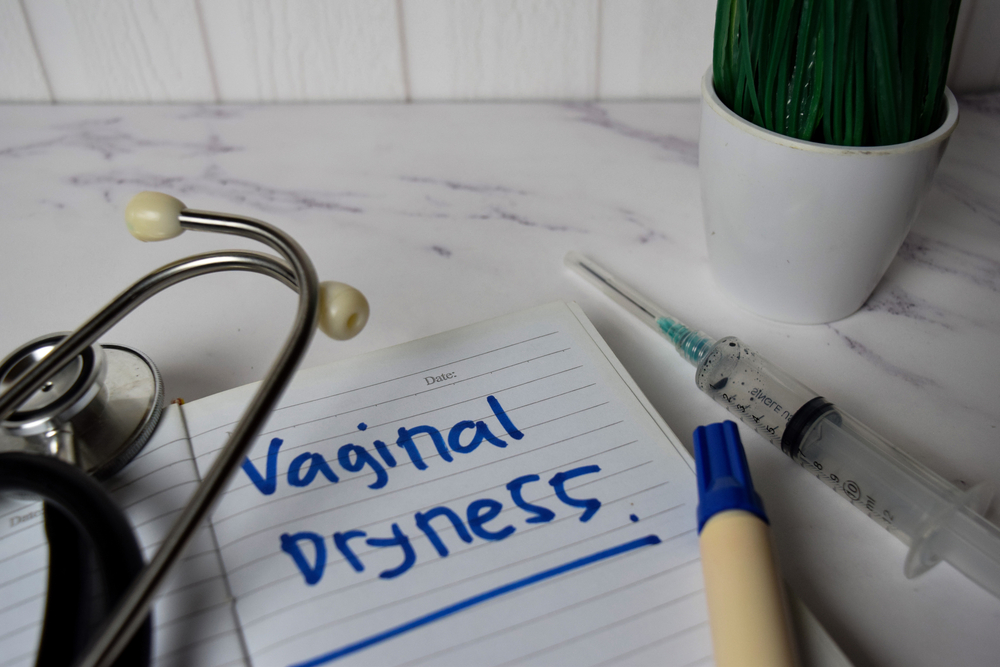
Overview
Vaginal dryness is a painful symptom brought on by different medical conditions. It can be caused by decreased hormone levels, breastfeeding, or certain medications.
While it is common in women during or after menopause, several women of different ages can experience vaginal dryness.
This condition can cause pain during standing, sitting, exercising, urinating (peeing), and sexual intercourse. There are several treatment options available to relieve vaginal dryness.
Key Facts
- The walls of the vagina are constantly lubricated with a thin layer of clear fluid.
- The hormone oestrogen produces this fluid.
- A drop in oestrogen can lead to dryness in the vagina.
- Vaginal dryness is a common condition that affects women of all ages.
- It is most common in women who have reached menopause.
- Vaginal dryness can be treated with specific medications after diagnosing the cause.
Symptoms & Diagnosis
Symptoms
Symptoms of vaginal dryness may include;
- Soreness, itching, or burning sensation in and around your vagina
- Pain or discomfort during sex
- Mild bleeding after sex
- Frequent need to pee more often than usual
- Repeated urinary tract infections (UTIs)
Diagnosis
If you are experiencing a burning sensation, itching, or general discomfort in and outside your vagina, you should see your doctor or gynaecologist.
Your doctor will ask questions about your health, how long you have had the symptoms, and what relieves or worsens them.
They will also conduct a pelvic examination to check your vagina for fluid or lack of redness. This is to rule out the possibility of a UTI causing pain and discomfort. A pap smear test might be conducted by removing cells from your vagina walls to examine in a lab.
Causes
One of the major causes of vaginal dryness is menopause. Most women will experience this symptom as they transition into this stage of their life. Another cause is a drop in oestrogen levels.
Oestrogen levels can also drop because of the following:
- Childbirth and breastfeeding
- Surgical removal of the ovaries
- Radiation or chemotherapy treatment for cancer
- Anti-estrogen medications are used to treat uterine fibroids or endometriosis.
Other causes include;
- Birth control pills.
- Chemotherapy, hormonal therapy, and other cancer treatments.
- Diabetes.
- Medications, including anti-estrogen medications, certain antidepressants, and antihistamines
- Sjogren’s syndrome.
Prevention
Ways to prevent vaginal dryness include;
- Avoid using douche, strong or perfumed soaps, or lotions in or around the vagina.
- Engage in heavy foreplay before sex to arouse and stimulate yourself, giving your body time to release enough fluid.
- Have sex regularly
Treatment
Topically applied oestrogen therapy is the most common treatment caused by a drop in oestrogen levels. It replaces some of the hormones in your bloodstream and relieves the symptoms of vaginal dryness.
Either one of these vaginal oestrogen pills will be prescribed:
- Ring (Estring): In this procedure, your doctor will insert a soft, flexible ring into your vagina. The ring releases a steady flow of oestrogen directly to the tissues. It is replaced every three months.
- Tablet (Vagifem): You will use the small applicator to insert the tablet into your vagina once every day for the first two weeks of the treatment. You can use it only twice a week after the first two weeks, and the symptoms have been relieved.
- Cream (Estrace, Premarin): You will use a disposable applicator to apply the cream in and on your vagina for 1 to 2 weeks. You can reduce it to three times a week as directed by your doctor.
Oestrogen products may have side effects, such as vaginal bleeding and breast pain.
However, topical oestrogen may not be recommended if you:
- Are treating breast cancer, especially with an aromatase inhibitor
- Are you treating or have a history of endometrial cancer
- Have unexplained bleeding from vaginal
- Are you breastfeeding or pregnant?
To relieve symptoms, you can also purchase a vaginal moisturiser like glycerin-min oil-polycarbophil (Replens) at your local pharmacy or supermarket.
Conclusion
Vaginal dryness is a condition that is often linked to menopause but can affect women of all ages. Its symptoms range from pain during sex, to frequent urination and a burning sensation in the vagina. There are several treatment options available to relieve vaginal dryness symptoms.
MOST COMMON






